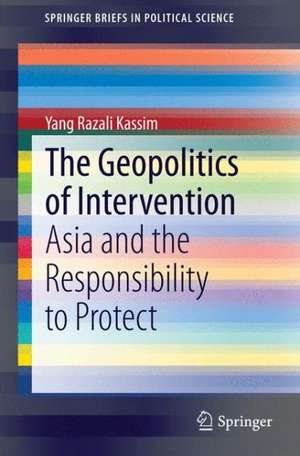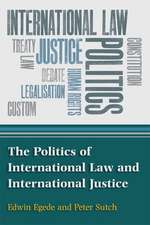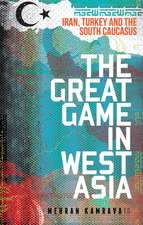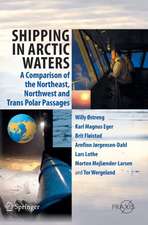The Geopolitics of Intervention: Asia and the Responsibility to Protect: SpringerBriefs in Political Science
Autor Yang Razali Kassimen Limba Engleză Paperback – 11 mar 2014
Din seria SpringerBriefs in Political Science
-
 Preț: 407.95 lei
Preț: 407.95 lei -
 Preț: 257.66 lei
Preț: 257.66 lei -
 Preț: 372.87 lei
Preț: 372.87 lei -
 Preț: 475.03 lei
Preț: 475.03 lei -
 Preț: 408.15 lei
Preț: 408.15 lei -
 Preț: 376.69 lei
Preț: 376.69 lei -
 Preț: 257.49 lei
Preț: 257.49 lei -
 Preț: 375.94 lei
Preț: 375.94 lei -
 Preț: 339.74 lei
Preț: 339.74 lei -
 Preț: 376.69 lei
Preț: 376.69 lei -
 Preț: 440.35 lei
Preț: 440.35 lei -
 Preț: 124.14 lei
Preț: 124.14 lei -
 Preț: 358.32 lei
Preț: 358.32 lei -
 Preț: 472.16 lei
Preț: 472.16 lei -
 Preț: 376.69 lei
Preț: 376.69 lei -
 Preț: 373.08 lei
Preț: 373.08 lei -
 Preț: 375.76 lei
Preț: 375.76 lei -
 Preț: 340.33 lei
Preț: 340.33 lei -
 Preț: 376.91 lei
Preț: 376.91 lei -
 Preț: 306.78 lei
Preț: 306.78 lei - 15%
 Preț: 516.50 lei
Preț: 516.50 lei -
 Preț: 378.04 lei
Preț: 378.04 lei -
 Preț: 372.11 lei
Preț: 372.11 lei -
 Preț: 374.98 lei
Preț: 374.98 lei -
 Preț: 375.76 lei
Preț: 375.76 lei -
 Preț: 441.69 lei
Preț: 441.69 lei -
 Preț: 372.11 lei
Preț: 372.11 lei -
 Preț: 377.08 lei
Preț: 377.08 lei -
 Preț: 472.71 lei
Preț: 472.71 lei -
 Preț: 440.90 lei
Preț: 440.90 lei -
 Preț: 443.38 lei
Preț: 443.38 lei -
 Preț: 441.28 lei
Preț: 441.28 lei -
 Preț: 373.82 lei
Preț: 373.82 lei -
 Preț: 373.82 lei
Preț: 373.82 lei -
 Preț: 372.31 lei
Preț: 372.31 lei -
 Preț: 259.60 lei
Preț: 259.60 lei -
 Preț: 373.45 lei
Preț: 373.45 lei -
 Preț: 257.66 lei
Preț: 257.66 lei -
 Preț: 377.28 lei
Preț: 377.28 lei -
 Preț: 259.38 lei
Preț: 259.38 lei -
 Preț: 372.70 lei
Preț: 372.70 lei -
 Preț: 307.91 lei
Preț: 307.91 lei -
 Preț: 375.76 lei
Preț: 375.76 lei - 5%
 Preț: 353.50 lei
Preț: 353.50 lei -
 Preț: 473.85 lei
Preț: 473.85 lei -
 Preț: 341.21 lei
Preț: 341.21 lei - 15%
 Preț: 458.65 lei
Preț: 458.65 lei -
 Preț: 376.53 lei
Preț: 376.53 lei -
 Preț: 375.94 lei
Preț: 375.94 lei
Preț: 374.98 lei
Nou
Puncte Express: 562
Preț estimativ în valută:
71.82€ • 73.99$ • 60.16£
71.82€ • 73.99$ • 60.16£
Carte tipărită la comandă
Livrare economică 24 februarie-10 martie
Preluare comenzi: 021 569.72.76
Specificații
ISBN-13: 9789814585477
ISBN-10: 9814585475
Pagini: 106
Ilustrații: VIII, 106 p.
Dimensiuni: 155 x 235 x 12 mm
Greutate: 0.17 kg
Ediția:2014
Editura: Springer Nature Singapore
Colecția Springer
Seria SpringerBriefs in Political Science
Locul publicării:Singapore, Singapore
ISBN-10: 9814585475
Pagini: 106
Ilustrații: VIII, 106 p.
Dimensiuni: 155 x 235 x 12 mm
Greutate: 0.17 kg
Ediția:2014
Editura: Springer Nature Singapore
Colecția Springer
Seria SpringerBriefs in Political Science
Locul publicării:Singapore, Singapore
Public țintă
ResearchCuprins
Preamble.- Chapter 1 The Rise of Responsibility While Protecting (RWP).- Chapter 2 The Arab Spring and the P5 Powers.- Chapter 3 China as a P5 Player.- Chapter 4 China, India, Japan and the emerging Eastphalian Order?.- Chapter 5 ASEAN and R2P.- Chapter 6 Critiques and Critics of R2P.- Chapter 7 Geopolitics of Intervention: Way Forward.- Chapter 8 Postscript.
Notă biografică
Yang Razali Kassim is a Senior Fellow at the S. Rajaratnam School of International Studies (RSIS), Nanyang Technological University (NTU) in Singapore. Prior to joining RSIS, he was a senior journalist with the Singapore Press Holdings, serving as Regional Editor at The Business Times and before that, Principal Assistant to the Editor as well as Senior Correspondent, The Straits Times, including a stint as Jakarta Correspondent. He was also a recipient of a Pan-Asia Award in Journalism by Citibank. Trained in Political Science at the then University of Singapore (now the National University of Singapore), he was a Wolfson Press Fellow at Wolfson College, Cambridge University and a Visiting Fellow at the Lowy Institute, Sydney. At RSIS, he is also a Senior Fellow with the Centre for Non-Traditional Security (NTS) Studies where he researches on non-traditional security issues including the politics and diplomacy of climate change, human security, particularly in ASEAN, as it relates to socio-political transitions, internal and cross-border conflicts as well as state-civil society relations in Southeast Asia. As a journalist, he covered major ASEAN meetings of political, security and economic ministers as well as the summits of APEC (the Asia-Pacific Economic Cooperation), ASEM (the Asia-Europe Meeting) and the WTO (World Trade Organization).
Textul de pe ultima copertă
This book reviews the global dilemma and tensions over whether to intervene or not to intervene in severe civil conflicts which test the validity of the new doctrine of Responsibility to Protect or R2P. It particularly assesses R2P’s relevance for Asia, which is defined broadly in this book to include West Asia or the Middle East and the region’s emergence as the most severe threat to international order in the form of the Arab Uprisings. While East Asia and South Asia have their share of situations that warrant R2P-justified interventions, it is the conflicts in West Asia that have severely tested the viability of R2P. Has this new norm been effective as a tool for international law and diplomacy? Are there prospects for a tweaking or repositioning of R2P as advocated by some scholars and governments to make the concept more acceptable to the global community, including Southeast Asia? Has the Westphalian doctrine of state sovereignty and non-intervention become superfluous as a result of the rise of R2P? Will a new doctrine of “Eastphalia” or “non-intervention with East Asian characteristics” emerge in its place, led by China as well as like-minded Asian and other states?
Caracteristici
Looks at the state of international politics and diplomacy as it faces its toughest modern-day challenge thrown up by the profound global debate on international humanitarian intervention and the new doctrine of Responsibility to Protect or R2P Covers some of the world’s most serious post-Cold War conflicts, including those in West Asia or the Middle East, namely the Arab Uprisings Assesses the global dilemma over whether to intervene or not to intervene in severe civil conflicts in sovereign states on humanitarian grounds or to uphold the Westphalian doctrine of inviolable borders Adds to the research on R2P’s relevance to Asia - an area that has not been sufficiently explored Outlines possible future trajectories of international intervention and R2P, including the far-reaching implications for world order from the international paralysis over Syria Provokes thinking on whether, out of the turmoil over R2P, the Westphalian concept of sovereignty and non-intervention will give way to “Eastphalia,” or a new idea of non-intervention led by Asian societies Includes supplementary material: sn.pub/extras













